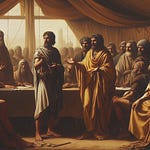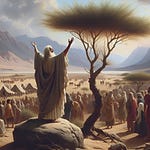Have you ever faced a moment when obedience to God seemed to put you in a worse position—trapped, cornered, and with no visible way out? In Exodus 14, God teaches us that sometimes He leads us into an impossibility—not to destroy us, but to magnify His glory and display His saving power.
Commentary
vv. 1–4 - We begin with a surprising divine command. God tells Moses to turn and camp near the sea, where Israel will appear hemmed in and at a disadvantage. But this was no tactical error. It was by divine design. Pharaoh would think, “They are entangled in the land” (v. 3)—and he would be right. But God had a plan which is found in verse 4: “I will be honoured upon Pharaoh.” The purpose is not to escape, but to exalt the God of Israel. God leads His people into difficult places to showcase His power. This is a moment of Kiddush HaShem—a sanctification of God’s name. The focus is not on vengeance, but a dramatic glorification of God. While God takes no delight in the death of the wicked, He does mighty acts to humble men and reveal His own character.
vv. 5–9 - Pharaoh’s regret, “Why have we done this, that we have let Israel go from serving us” turns quickly into rage. He mobilizes six hundred chosen chariots—the military might of the land. These were not transport wagons, but the equivalent of ancient tanks: swift, maneuverable, and deadly. The word for “captains” refers to officers ranked just under princes. The military power of Egypt is arrayed against a band of former slaves. From a human perspective, Israel doesn’t stand a chance. But God had drawn Pharaoh out, and the hunter walked into a trap.
vv. 10–14 - When the Israelites saw the Egyptians coming, they simultaneously cry out to the Lord and turn on Moses. The language in verse 11, “Because there were no graves in Egypt…” drips with bitter irony. Egypt was known for its tombs, and this sarcastic reflection suggests that if the aim was to die they would have been better staying where they were. Unbelief often wears the mask of wit. This is the voice of fear, not faith. Moses’ response in verses 13–14 is one of his most memorable moments: “Fear ye not, stand still, and see the salvation of the LORD.” This is not passivity. The verb for “stand still” implies a readiness—an alert, battle-ready posture of trust. And Moses gives a promise to match the command: “The LORD shall fight for you, and ye shall hold your peace.” True stillness is not surrender. It is settled faith in the power of God.
vv. 15–20 - Then something unexpected happens. In verse 15, God says to Moses, “Wherefore criest thou unto me?” But there is no record of Moses praying aloud. Perhaps it was a silent prayer. Whatever the case, God reproves it—not because prayer is wrong, but because at times, prayer can mask hesitation. This was the moment to move. “Speak unto the children of Israel, that they go forward.” As Moses lifts his rod in obedience, the Angel of God moves from before the camp to behind it. This is not a created angel. This is the Angel of the LORD—the same who appeared in the burning bush. He is both with God and is God. He is the pre-incarnate Christ. He shields the people from Egypt and stands between them and danger. And notice the beautiful paradox: the same cloud that gives light to Israel gives darkness to Egypt. The presence of God is a dividing line—help for the redeemed and confusion for the lost.
vv. 21–29 - Then comes the miracle. Moses stretches out his hand, and the waters divide. A wall of water rises on either side, and the people pass through on dry ground. Paul in 1 Corinthians 10:2 calls this a baptism—a sign of identification with Moses, yes, but ultimately a pattern of salvation as the Israelites pass through judgment, not around it. Egypt follows. But when the time comes, God commands Moses again to stretch forth his hand. And when he does, the waters collapse. The text is emphatic: “There remained not so much as one of them” (v. 28). Total judgment. The word “overthrew” (v. 27) means to shake off—as one shakes crumbs from a garment. God simply shakes Egypt into the sea.
vv. 30–31 - The chapter ends in quiet reverence. “Israel saw the Egyptians dead upon the sea shore.” That image was not gratuitous. It was necessary. Seeing God’s judgment leads to reverence. We’re told, “The people feared the LORD, and believed the LORD, and his servant Moses.”
Application
God may lead you into danger—but never into defeat. Verse 1 makes it plain: the detour into a dead end was God’s idea. Sometimes obedience brings hardship, not relief. God will not always lead you by the easiest route—but He will always lead you by the best route. Christian, if you’re hemmed in—by pressures, problems, or persecution—do not assume you’ve taken a wrong turn. Even if sin has brought you consequences, God will use the path to deepen your repentance and show you the glory of his mercy.
When fear tempts you to retreat, stand still and see. Moses doesn’t scold Israel for feeling afraid—he corrects them for letting fear drive their thinking. “Fear ye not, stand still, and see the salvation of the Lord.” You don’t need to run. You don’t need to fix it. You need to trust. The call is not to passivity, but to believing poise. Faith holds its ground when sight wants to flee. This chapter calls you to stop fretting and start trusting. Stand still and see what God will do.
The same work that saves also judges. Israel passed through the sea; but Egypt perished in it. One path—two outcomes. The same cross that pardons believers condemns unbelievers. The same Christ who saves by grace will one day judge in righteousness. There is no neutral response to the gospel. You are either sheltered by the blood or swallowed by the flood. Children, what is true form you? You’re hearing the same gospel that has saved others yet you remain in unbelief. Don’t miss your opportunity. You can be saved today.
Jesus is the guide, guardian and mediator of the people of God. There’s a wonderful plurality of Christological types in this chapter, in which we see the divinity of the Son as the Angel of God protecting and guiding His people, and the humanity of the promised Messiah in the mediation of Moses. If you are to escape Satan’s pursuit of your soul your only hope is in Christ. Let me urge you to seek Him today. He is the only way to freedom, forgiveness, and deliverance.
The right response to deliverance is fear and faith. Verse 31 says they feared the Lord and believed the Lord and His servant Moses. This is no cringing terror—it’s awe-struck reverence. When you see what God has done to save you, when you see your enemies defeated and your feet on dry ground, the only right response is reverent trust. There is nothing casual about being a Christian. This chapter underlines God’s desire that we worship and obey Him.
“A vigorous faith will often shut its eyes to difficulties. When faith looks upon a difficulty as being exceedingly great, then she turns to prayer. But on the other hand, after having sought God’s help, and having received it, she frequently laughs at the impossibility and cries, “It shall be done,” and then, instead of betaking herself any longer to her knees, she boldly marches on, believing that the difficulty will vanish before her.” — Charles Spurgeon










